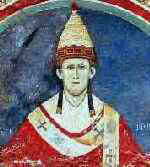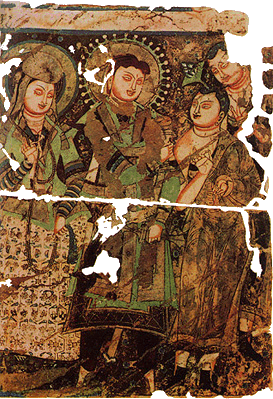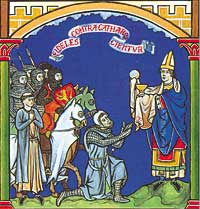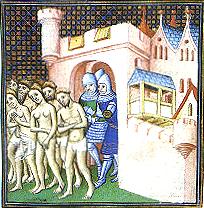|
Rotten Library > Religion > Cathars
Cathars The Cathars believed that the world was split along lines of matter and spirit, good and evil. They believed in purifying themselves, clean living, chastity, poverty and equality of the sexes.
The Cathars believed that the world was split along lines of matter and spirit, good and evil. They believed in purifying themselves, clean living, chastity, poverty and equality of the sexes.If you're thinking to yourself, "danger, danger, must exterminate," you would have made a good Pope Innocent III. The Cathars were a gnostic Christian sect that arose in the 11th century, an offshoot of a small surviving European gnostic community that emigrated to the Albigensian region in the south of France. The name "Cathar" comes from a Greek work meaning "Pure Ones," a noble enough sentiment but one that would get them into a lot of trouble. They took the "pure" thing very seriously. Cathars reportedly took vows of chastity, poverty and non-violence. Sounds innocuous? Hell, no! The Catholic Church was the dominant religious force in France at the time. Medieval priests were somewhat less than scions of morality, however. For one thing, they were notorious lechers, fornicating all over the place and fathering bastards where ever they went. Other clerical practices of the time included selling salvation to the highest bidder and accumulating large amounts of property and personal wealth. The priests felt that all this poverty and chastity was making them look bad, which in fact it was. The Cathars were very popular at the time, and they developed a strong base of support. They were also buddies with the Knights Templar, a powerful and fabulously wealthy Holy Grail cult based in the region.
Innocent launched a Crusade against the Cathars, who managed to endure for about 20 years, despite the whole non-violence thing, a rather remarkable accomplishment when you think about it. The Crusaders slaughtered whole towns, sometimes indiscriminately, in search of the heretics. After the open warfare had ended, those pesky Cathars STILL hadn't been exterminated. There were stories that the Knights Templar, also based in the region, had preserved some of the Cathar secrets and sacraments, possibly pertaining to the Holy Grail or the existence of living descendants of Christ in the region, offspring resulting from hot heretical action with Mary Magdalene. Pope Clement V and the King of France sent the Inquisition to exterminate the Templars, but that had less to do with the Cathars than the Templars' fabulous real estate holdings, which both the pope and the king coveted. Regardless of the various baser motivations behind the killing of the Cathars, their beliefs did appear to be fairly heretical, although the primary historical record comes from their murderers.
The Cathars had no use for the Catholic sacraments, according to contemporary accounts. Once medieval inquisitor reported that the Cathars were particularly down on Holy Communion, pointing out that "the eucharist (...) cannot contain the body of Christ, for had this been as great as the largest mountain Christians would have entirely consumed it before this." The Inquisitors apparently felt Jesus was an all-you-can-eat deal.
As the wrath of Innocent III descended on the Cathars, the luxuries of non-violence and vegetarianism grew to be problematic. Consolamentum was often delayed until the final moments of life; the Catholics countered by inventing the "last rites," a sacrament in which a dead person receives a blessing with no tangible benefit from an attending priest. As it became increasingly associated with deathbeds, stories began to circulate that the consolamentum was actually an assisted Suicide ritual, in which the participant was sent off to meet God with the help of some lengthwise gashes along the wrists. This may have been Catholic propaganda, but since it's much more colorful and garish than the other version, we recommend that you believe it.
|
 The ironically named Pope Innocent III came on the scene as the 11th Century became the 12th, and he had some pretty specific ideas about the papacy, based on the groundwork laid by his predecessors. Chief among these notions was that the pope should be king of the world. As such, he had to send out a message to the common folk: "Resistance is futile. Prepare to be assimilated."
The ironically named Pope Innocent III came on the scene as the 11th Century became the 12th, and he had some pretty specific ideas about the papacy, based on the groundwork laid by his predecessors. Chief among these notions was that the pope should be king of the world. As such, he had to send out a message to the common folk: "Resistance is futile. Prepare to be assimilated." The Cathars are thought to have been a pretty pure offshoot of the original Gnostics. They believed the God of the Old Testament was a blind and evil god, responsible for creating the world of matter. Ipso facto, the world of matter was therefore evil and should be spurned, including all its perks, such as sex, drugs, goodies and rock-n-roll. They are also thought to have believed that
The Cathars are thought to have been a pretty pure offshoot of the original Gnostics. They believed the God of the Old Testament was a blind and evil god, responsible for creating the world of matter. Ipso facto, the world of matter was therefore evil and should be spurned, including all its perks, such as sex, drugs, goodies and rock-n-roll. They are also thought to have believed that  Instead, the Cathars came up with their own sacraments, including the consolamentum, a yearlong bodily purification which ended in a vow to be poor, non-violent, celibate and Vegan. In other words, they promised not to enjoy anything, period. They also had a dramatically scaled down "breaking of the bread" (sans logic-defying cannibalistic elements) and public confessions.
Instead, the Cathars came up with their own sacraments, including the consolamentum, a yearlong bodily purification which ended in a vow to be poor, non-violent, celibate and Vegan. In other words, they promised not to enjoy anything, period. They also had a dramatically scaled down "breaking of the bread" (sans logic-defying cannibalistic elements) and public confessions.